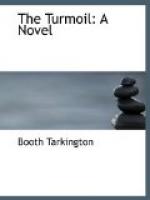He looked at her steadily, and his gaze was as keen as it was steady. She met it with unwavering pride. Finally he nodded slowly, as if she had spoken and he meant to agree with what she said.
“Ah, yes,” he said. “I won’t come into the smoking-room again. I’m sorry, Edith. Nobody can make you see anything now. You’ll never see until you see for yourself. The rest of us will do better to keep out of it—especially me!”
“That’s sensible,” she responded, curtly. “You’re most surprising of all when you’re sensible, Bibbs.”
“Yes,” he sighed. “I’m a dull dog. Shake hands and forgive me, Edith.”
Thawing so far as to smile, she underwent this brief ceremony, and George appeared, summoning Bibbs to the library; Dr. Gurney was waiting there, he announced. And Bibbs gave his sister a shy but friendly touch upon the shoulder as a complement to the handshaking, and left her.
Dr. Gurney was sitting by the log fire, alone in the room, and he merely glanced over his shoulder when his patient came in. He was not over fifty, in spite of Sheridan’s habitual “ole Doc Gurney.” He was gray, however, almost as thin as Bibbs, and nearly always he looked drowsy.
“Your father telephoned me yesterday afternoon, Bibbs,” he said, not rising. “Wants me to ‘look you over’ again. Come around here in front of me—between me and the fire. I want to see if I can see through you.”
“You mean you’re too sleepy to move,” returned Bibbs, complying. “I think you’ll notice that I’m getting worse.”
“Taken on about twelve pounds,” said Gurney. “Thirteen, maybe.”
“Twelve.”
“Well, it won’t do.” The doctor rubbed his eyelids. “You’re so much better I’ll have to use some machinery on you before we can know just where you are. You come down to my place this afternoon. Walk down —all the way. I suppose you know why your father wants to know.”
Bibbs nodded. “Machine-shop.”
“Still hate it?”
Bibbs nodded again.
“Don’t blame you!” the doctor grunted. “Yes, I expect it’ll make a lump in your gizzard again. Well, what do you say? Shall I tell him you’ve got the old lump there yet? You still want to write, do you?”
“What’s the use?” Bibbs said, smiling ruefully. “My kind of writing!”
“Yes,” the doctor agreed. “I suppose it you broke away and lived on roots and berries until you began to ’attract the favorable attention of editors’ you might be able to hope for an income of four or five hundred dollars a year by the time you’re fifty.”
“That’s about it,” Bibbs murmured.
“Of course I know what you want to do,” said Gurney, drowsily. “You don’t hate the machine-shop only; you hate the whole show—the noise and jar and dirt, the scramble—the whole bloomin’ craze to ‘get on.’ You’d like to go somewhere in Algiers, or to Taormina, perhaps, and bask on a balcony, smelling flowers and writing sonnets. You’d grow fat on it and have a delicate little life all to yourself. Well, what do you say? I can lie like sixty, Bibbs! Shall I tell your father he’ll lose another of his boys if you don’t go to Sicily?”




